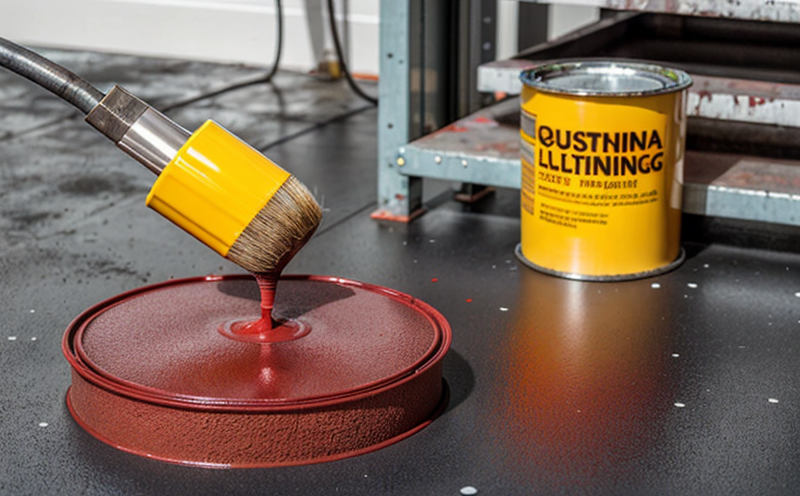Industrial Coatings, Paints & Surface Finishing Testing
In industrial manufacturing and processing, coatings, paints, and surface finishing play a critical role in protecting materials from corrosion, wear, and other environmental factors. Ensuring the quality of these finishes is essential for maintaining product integrity and performance over time.
The testing of industrial coatings, paints, and surface finishes involves a variety of methods aimed at evaluating key properties such as adhesion strength, thickness, flexibility, abrasion resistance, chemical resistance, and weatherability. These tests are performed using internationally recognized standards to ensure consistency and reliability across industries.
For instance, the ASTM D1002 standard provides guidelines for measuring the dry film thickness of coatings on metal substrates. The procedure involves coating a metal panel with the material in question and then carefully removing it to measure the remaining coating layer's thickness using an appropriate gauge. This method is crucial because the thickness of the coating can significantly affect its protective properties.
The adhesion strength, another critical property, ensures that the coating remains securely attached to the substrate surface. The ASTM D3359 standard describes a cross-cut adhesion test where small cuts are made in the dried film and then coated with adhesive tape. After adhering for a specified time, the tape is pulled off to assess how much of the coating layer comes away with it.
Flexibility testing (ASTM D522) involves bending the coated sample through a specific angle and measuring any cracking or flaking that occurs during this process. This test helps determine if the coating can withstand changes in temperature and mechanical stress without damage, which is particularly important for outdoor applications.
Abrasion resistance (ASTM D1042) assesses how well the surface resists wear by rubbing against a rough surface under specified conditions. This property is vital for ensuring that coatings maintain their integrity over extended periods of use in harsh environments.
Chemical resistance testing follows standards like ASTM G31 to evaluate a coating's ability to withstand exposure to various chemicals without significant deterioration. This test is especially relevant for industrial applications where the product may come into contact with aggressive chemicals during manufacturing or storage.
Weatherability testing (ASTM D1525) simulates real-world weather conditions on coated surfaces, including ultraviolet radiation, heat, and humidity. This helps determine how well a coating will perform over its intended lifespan under typical environmental exposure.
The quality of industrial coatings is not only important for the final product but also for ensuring compliance with industry regulations and customer expectations. By adhering to these testing methods and standards, manufacturers can ensure that their products meet both functional requirements and regulatory guidelines.
Benefits
- Enhanced Product Quality: Rigorous testing ensures that only high-quality coatings are used in industrial applications, leading to improved product performance and reliability.
- Regulatory Compliance: Adherence to international standards helps manufacturers ensure their products meet all necessary regulatory requirements, reducing the risk of non-compliance issues.
- Increased Customer Satisfaction: Consistent quality and reliability in industrial coatings translate directly into higher customer satisfaction and loyalty.
- Fuel Cost Savings: Properly applied and well-performing coatings can reduce maintenance costs by extending the life of equipment and infrastructure.
Customer Impact and Satisfaction
The impact of industrial coatings testing extends beyond just the manufacturing process to influence customers in several ways. By ensuring that only high-quality, durable coatings are used, manufacturers can offer products that meet or exceed customer expectations for performance and longevity.
This translates into satisfied end-users who benefit from longer-lasting equipment and infrastructure. For example, in construction projects where durability is crucial, well-tested industrial coatings can significantly extend the life of buildings and structures, reducing maintenance costs over time. In manufacturing environments, reliable coatings can help minimize downtime by preventing premature failures.
In addition to practical benefits, testing also instills confidence among customers regarding the quality of products they purchase. This trust can lead to repeat business and positive word-of-mouth referrals, further enhancing customer satisfaction within the industry.
Use Cases and Application Examples
- Metal Fabrication: Ensuring that coatings applied to metal structures in construction projects are durable enough to withstand weathering over decades.
- Automotive Manufacturing: Testing the protective layers used on car bodies to ensure they can resist scratches, corrosion, and other forms of wear during extended use.
- Petrochemical Industries: Evaluating coatings applied to storage tanks and pipelines to confirm their resistance to harsh chemicals and extreme temperatures.
- Electrical Equipment Manufacturing: Assessing the insulating properties of paints used in electrical components to ensure they can operate safely under various conditions without degradation.





